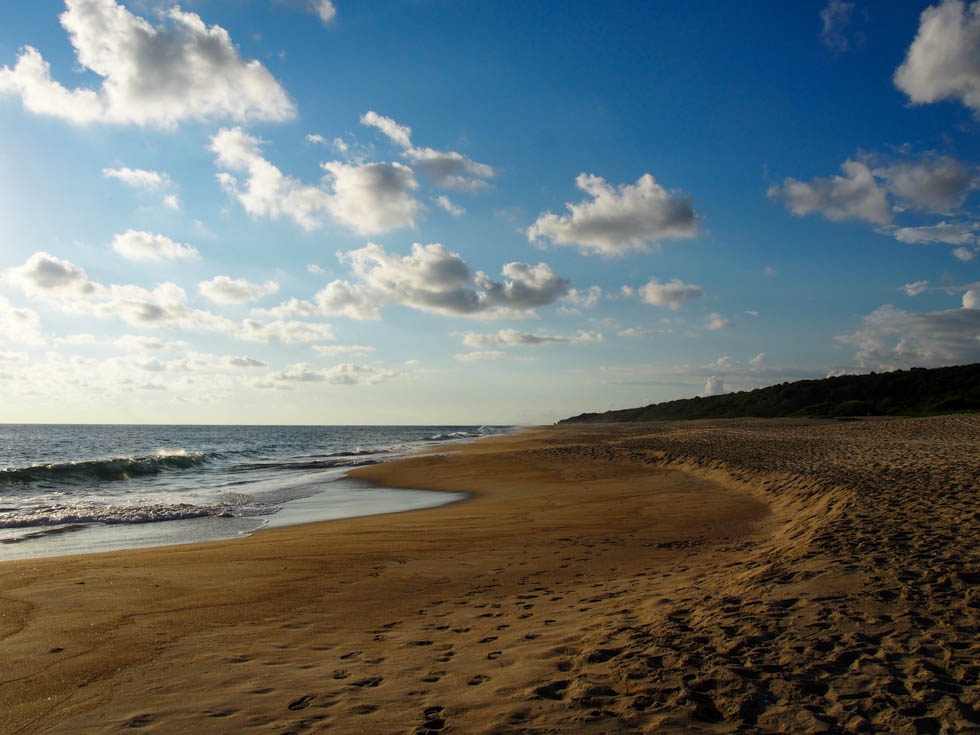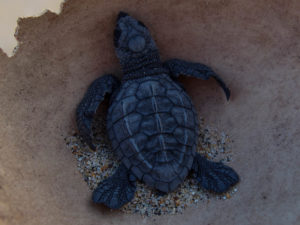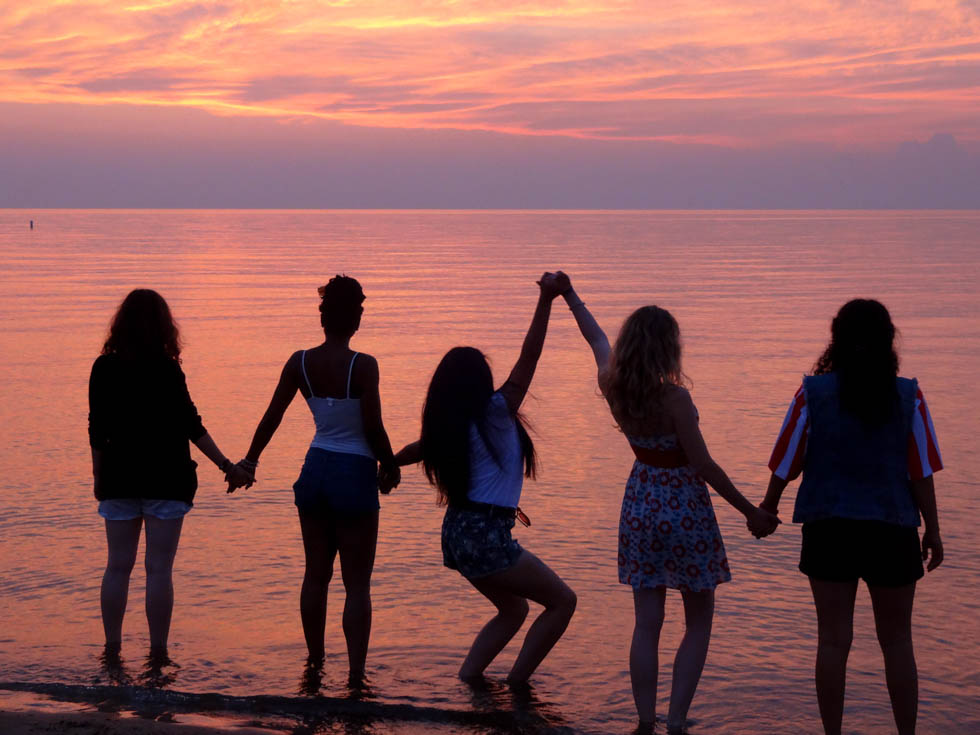
Puerto Escondido’s quiet and tranquil Playa Bacocho
It was time to go home – and by home, I mean the hostel where I was staying during my 8 days in Puerto Escondido, Mexico. I had just spent an hour at Playa Bacocho, one of Puerto Escondido’s picturesque beaches, learning about the life cycle and reproductive journey of the turtles in the region. My impromptu class on conservation biology ended with a climactic release of a baby turtle by means of a coconut shell into the towering surf, where it would hopefully begin a long journey of growth, maturation, and eventual return to the Oaxacan coastline to reproduce a few years down the line. Coupled with the absolutely spectacular sunset that evening, I was feeling really good. Once the sun had indeed dipped below the horizon and my baby turtle had made its way into the water, I began my 3 kilometer trek back to the hostel.

I felt like a proud mama helping this baby turtle on its way into the sea…
Puerto Escondido was, for me, well worth the visit. I spent over a week lazily making my way around the small, hot city, doing things that I like to do: dancing salsa, going for runs, taking walks around town, visiting the beach, lazing about by the pool, and eating really well.
There is a stretch a few blocks long, between Playas Carrizalillo and Bacocho, full of restaurants and bars and shops. As I was walking along the footpath contemplating which restaurant to try tonight, I hear a “hello!” Puerto Escondido is very small. I had only been there for a few days and already was bumping into people I knew, left and right.
I spin around and recognize four women also staying in my hostel. I wave and chirp, “¡Hola!” They ask where I’m off to, and I respond that I’m looking for a place to eat. Being the welcoming backpackers that they are, they invite me to join them. I smile and pull up a chair.
I don’t know most of the women at the table, but everyone introduces themselves and we launch into the typical traveler talk. What’s your name, where are you from, what’s your deal, etc. My dinner companions are from Slovenia, Austria, Germany, and the United States. I marvel at being in a space with only women for the first time in a really long time. Since arriving in Mexico I had met so many people, both locals and foreigners, most of whom were men. So to be in this space, with five women and zero men, well… it was both rare and welcome.
So we’re chatting about everything and nothing, about traveling and politics and our lives back in our respective countries. The conversation shifts to Puerto Escondido nightlife and the big salsa block party that occurred the night before. Turns out everyone at the table had gone to last night’s party. It was while discussing the party that one of the women, let’s call her Jane, mentions another woman who is also staying in the hostel. Jane softly continues, “She was wearing so much makeup.”
It was said in a cautious, almost questioning way. Like she was trying to say, “listen to this observation” as opposed to “listen to this criticism.” As if with a delicate tone, the subject matter wouldn’t come across as gossipy at best, or cruel at worst.
As an observer and a participant in this conversation, this was a very critical moment. I had to say something.
“What’s wrong with a lot of makeup?” I carefully asked.
Jane seemed uncomfortable. “It just scared me a little bit. She seemed like she was hiding herself,” she responded.
There was a pregnant pause at the table. Another one of the women, let’s call her Sarah, then chimed in. “It’s just not that common to see backpackers wearing a lot of makeup,” she said, in what I saw as an attempt to be neutral. “We tend not to care that much.”
Maybe Jane and Sarah didn’t care that much, but I did. Let’s break this down, shall we?
Sexism 101 and femininity
In our patriarchal society, those who are male or who present as male are afforded certain privileges, and those who are female or who present as female are systemically disenfranchised. If you are unfamiliar or uncomfortable with the concept of patriarchy, I suggest this article/video.
Sexism is the tool that keeps the patriarchy in place. It instills a hierarchy between men and women, placing men and women into strict boxes (a “real man” does this, it’s not “ladylike” to do that, etc.). This forced separation of gender and reinforcement of gender roles can be considered gender policing.
One manifestation of sexism is the devaluation and rejection of femininity. We are constantly shown the ways in which masculinity is deemed valuable. We associate masculinity with strength, heroism, “breadwinning” or providing for one’s family, bravery, stoicism, and power, to name a few. However, we are rarely taught that femininity is anything other than weak, superficial, frivolous, ornamental, and in existence for the pleasure and benefit of men.

Have you ever seen such a beautiful shade of pink? Flowers and palm tree branches seen in Puerto Escondido
Femininity is not inherently negative, and the expression of femininity is not one-size-fits-all. I like Julia Serano’s examples of feminine traits in her fabulous essay Empowering Femininity: “In our culture, a trait is deemed ‘feminine’ if it is often associated with women. Common examples include being verbal and communicative, emotive or effusive, being nurturing and having an appreciation for beautiful or aesthetically pleasing things.”
This last example (“having an appreciation for beautiful or aesthetically pleasing things”) is the aspect of femininity that I specifically want to address in this post. This aspect of femininity manifests itself in many ways, one way being in each individuals’ unique look or aesthetic. We associate “looking feminine” and “traditional femininity” with wearing makeup, styled hair, tight clothing, dresses and skirts, high heels, and so on, and so forth. In many instances this traditionally feminine aesthetic is forced upon women, for example, when women are told that they need to look pretty, “play up their femininity”, etc., oftentimes for the sake of attracting male attention. No human should ever be forced to “be feminine” or to look traditionally feminine, regardless of the body into which they were born. Femininity that is forced on an individual is called “compulsory femininity”, which is a form of gender policing.
But what about the individuals that want to engage with a more traditionally feminine aesthetic, because that is what feels real and true to them?
When it comes to appearance, women are faced with a double standard. We are taught that our value lies in our appearance, our sex appeal, and our ability to be pleasing to men. However, we are also taught that focusing on our appearances is superficial! Additionally, as a society we have very narrow ranges for what is considered “acceptable” or “decent” feminine expression. Women are told to wear makeup to look more beautiful, but only to accentuate our “natural beauty” (which is really just code for, only women who are naturally beautiful “enough” without makeup are acceptable, according to Eurocentric beauty standards). Women are told to dress femininely but not inappropriately, but this is also an impossible standard to meet because “appropriateness” is in the eye of the beholder.
This gender policing does not only exist for female or female-presenting bodies. The gendered hierarchy of masculinity = good and femininity = bad is reinforced by teaching men that, god forbid, they associate with femininity in any way. Men are taught that pink is a girls’ color, that “real men don’t cry”, not to “act like a girl”, to “man up” and not “pussy out”… I could go on and on. The gender policing of men serves to reinforce that, in order to preserve their status in the patriarchy, men must reject their femininity.
I am a firm believer that every human should do whatever the hell they want. Want to wear makeup? Awesome. Hate makeup and never want to touch it? Also cool. What’s not okay is forcing your personal preferences onto others. This is one form of policing a person and Jane’s comment, whether intentional or not, is an example of this. Being a woman (or presenting as a woman) does not mean that one must wear pink, or wear skirts, or wear lipstick. And if a person does choose to wear pink, or skirts, or lipstick, this choice has absolutely no bearing on their value.
We have to unlearn the idea that feminine expression is superficial, impractical, and valueless. Because, quite simply, it’s not. What is more practical and valuable than a person looking and acting in a way that feels good to them? This affects mental health and overall happiness in many individuals. Plus, my high heels really help me with my posture on the dance floor, so you can keep your practicality arguments, thank you very much!
I believe that it is particularly important to empower femininity and recognize the value of femininity, because femininity is and has been rejected by society. We should reject compulsory femininity but accept that traditional feminine gender expression feels natural and right for some people. It can be difficult to recognize how badass it is to be feminine, because of all the cultural pressure telling us otherwise. So to those individuals who wear their femininity with pride, props to you. Empowered femininity is radical and an act of resistance.
Understanding and rejecting internalized sexism
In our patriarchal society, we are accustomed to men (the holders of power and privilege) perpetuating sexism in intentional and unintentional ways. However, as a society we also maintain the patriarchy through internalized sexism. Internalized sexism is the belief by women that sexist stereotypes, beliefs, and lies about women and femininity are true.
Internalized sexism fuels self-doubt. An example of internalized sexism could be any woman who thinks to herself, “maybe I can’t solve this math problem because of my gender”, as opposed to “partial differential equations are freaking hard for anyone, regardless of gender”.
Internalized sexism also fuels a sense of distrust and competition between women. After all, we are implicitly taught that rejecting femininity increases our social status, because masculinity and masculine traits are deemed as more valuable. So a woman who judges another woman for whatever reason, for her appearance, for her (actual or perceived) sex life, for not fitting into the perfect and unattainable box of “real woman”, allows that woman the guise of power and “higher status” on the gendered hierarchy. Yet any manifestation of sexism, be it outward or internalized, is inherently damaging for all women. The policing of gender just reinforces rigid gender roles, which are inherently violent and are especially violent towards women. (See: rape culture).
As women, one of our greatest threats to the patriarchy is through our bonding and mutual uplifting. Viewing other women as “the competition” just creates division among women, who as a group are disenfranchised. And one surefire way to ensure that an oppressed group remains opposed is through infighting. If women judge, distrust, and fight each other, then we’re not using our valuable time and energy smashing the patriarchy. The recognition and rejection of internalized sexism by women is a pivotal part of making social change. Because seriously, women who love themselves and who love, respect, uplift, and empower one another are a force to be reckoned with.

That magical moment when a bunch of empowered women join hands…
Rejecting sexism in backpacker culture
Let’s bring the discussion back to the dinner table in Puerto Escondido.
Sarah and Jane’s comments bothered me for a number of reasons. The whole discussion began with a judgement about one woman’s use of makeup, which is an unnecessary judgement in the first place. If this woman feels good about her makeup, then it doesn’t matter in the slightest how anyone else feels about it. Also, the judgement about a woman who wears “too much makeup” just plays into the double standard that we battle on a daily basis. We should wear makeup, but only in certain circumstances (like for a date with a man) and only in a way that highlights our “natural beauty.” This woman’s expression of femininity did not fall in line with what Jane deemed to be acceptable, and as such her gender expression was devalued.
And as for the idea that (female) backpackers tend not to wear makeup, because we tend not to care… that’s just coded sexism. What it really means is, “There is one way for female backpackers to be legitimate backpackers.” And that “one way” essentially is, “more like a man.” Less feminine, more masculine. Less frivolous, more “practical.”
But guess what? Men are not the standard of backpackers, and neither is a face free of makeup. I can be a rugged backpacker wearing bright red lipstick. And if I choose to do so I’m no less of a backpacker because of it.
I can sense a counterargument from backpackers along the lines of, “but there’s not that much room in a backpack, especially for extraneous items like makeup.” And to that, I call shenanigans. For some people, makeup is not an extraneous item. For some people, makeup is an essential part of their self-image and mental health. For some people, makeup is an essential part of their happiness. This is nobody’s place to judge. For those backpackers who want or need makeup, there will be room enough in the backpack. Their backpack, their life, their business.
I refuse to bond with other women through internalized sexism, and I refuse to bond with other women by judging another woman based on her appearance and her choices. As if we don’t all get judged and harassed enough by men. I find these comments unacceptable and detrimental to all of us, so I spoke up as anyone should in similar circumstances.
In the most respectful way possible, I expressed that I don’t believe in judging a woman for how much makeup she wears, because that is fundamentally her choice. People wear makeup for different reasons – for self-expression, because makeup makes them feel good, because makeup conceals acne and other skin conditions, which are never considered beautiful in spite of all that “natural beauty” bullshit, because they feel the pressure of a society that judges appearances first, because they simply want to… and any and all reasons for wearing makeup are valid. Any and all expressions of femininity are valid. Femininity is important and valuable; by recognizing its value and giving everyone the freedom to express their femininity without judgement, we can build a world with less gendered violence.
This backpacker travels with makeup, feels great about her femininity, and rejects the patriarchy and internalized sexism wearing sundresses and purple lipstick. How about you?










8 comments
Oh maaaaan, Alissa! This post is SPOT ON. These things are constantly going through my head…I’ve been riding a bicycle solo in Latin America for 15 months now, and believe it or not, it’s usually the women who seem more sexist than men. I carry makeup in my panniers, and a dress to doll up when I feel like it 😀 The thing that I’m thinking about all the time is that women victimise themselves. This doesn’t have so much to do with the makeup example, but just have to get it out: many a times women are the ones who tell other women what they should and shouldn’t do. It’s like we/they already have a role and we need to play it well..
I hear you, Sissi! It’s so unfortunate when women are judgmental of other women – which just goes to show that there are so many women who have a tremendous amount of their own unlearning to do when it comes to gender and gender roles. But one (of the many) awesome things about feminism is that it strives for every woman to have the freedom to make the choices that are right for her… even if someone else wouldn’t make that choice for them. So just keep being a badass with your bike, dress, and makeup – if anyone judges you for it just direct them to me! hahaha. Have an amazing trip!! Thank you for reading and for your supportive comment 🙂
I completely agree with you on this. I get judged for not shaving my legs (this week, one man told me “I don´t judge you because when you are at home, surely you are shaved” – I don´t have to tell you how I felt about that comment…) and while most of inappropriateness comes to me from men, it is sad that women don´t realize how harmful it can be to adopt these ideas of how we “should” be. If not even women know this, how can we build a balanced society all together?
Goes without saying (but Imma say it anyway!!) – the guy who made that comment to you is a total shithead. I’m very sorry that happened to you. Also, unshaved legs are pretty freaking great – the hair is so soft! Anyway…
Yeah, I definitely hear you about inappropriateness from men vs. women. I think that, because of male privilege, there are very different implications to a man making a sexist comment vs. a woman making a sexist comment. I wrote this post as a call to action for women because I think we really need to cut the patriarchal nonsense out of our spaces, but I am hoping that any man reading this post could also reflect on any judgements that he makes on women – because they’re detrimental regardless of where the judgements are coming from. Anyway, I feel myself going off on a tangent so I’m going to reel it in here. Thank you so much for reading and for your thoughtful comment!
Yeah, he was a dickhead, I reported him to Couchsurfing support and he was banned since. Thank you for finding the time to respond! I agree we need to respect our freedom more than that if we want to live in an equal society.
So I only just now discovered your comment (two months late!) because my comment filter sent it straight to the trash? …Not sure what happened there but I’m sorry to publish your response so late! Anyway, thank YOU for taking the time to respond and read and all your support! 🙂
Great post! I backpacked for years and always managed to pack my makeup without ~space issues. And I met people along the way who did everything from barefaced to full-on glam, in hostels. And hey, all of them were backpackers! It’s the same attitude you see when people gripe about those who wear make-up to the gym…but hey, we could probably talk about this all day.
Absolutely! People should just be able to live their lives, “you do you”, without so much judgement. We’re also just conditioned to judge (women especially) by appearances… but hopefully little by little we’ll chip away at this until people get the message that it’s just not that big of a deal. Thanks for reading and for your thoughtful comment, Emily!